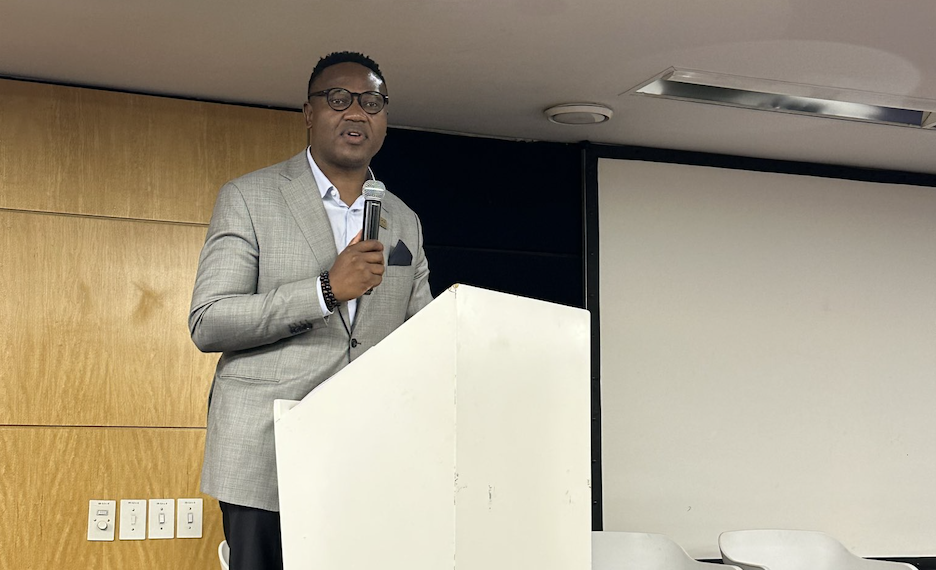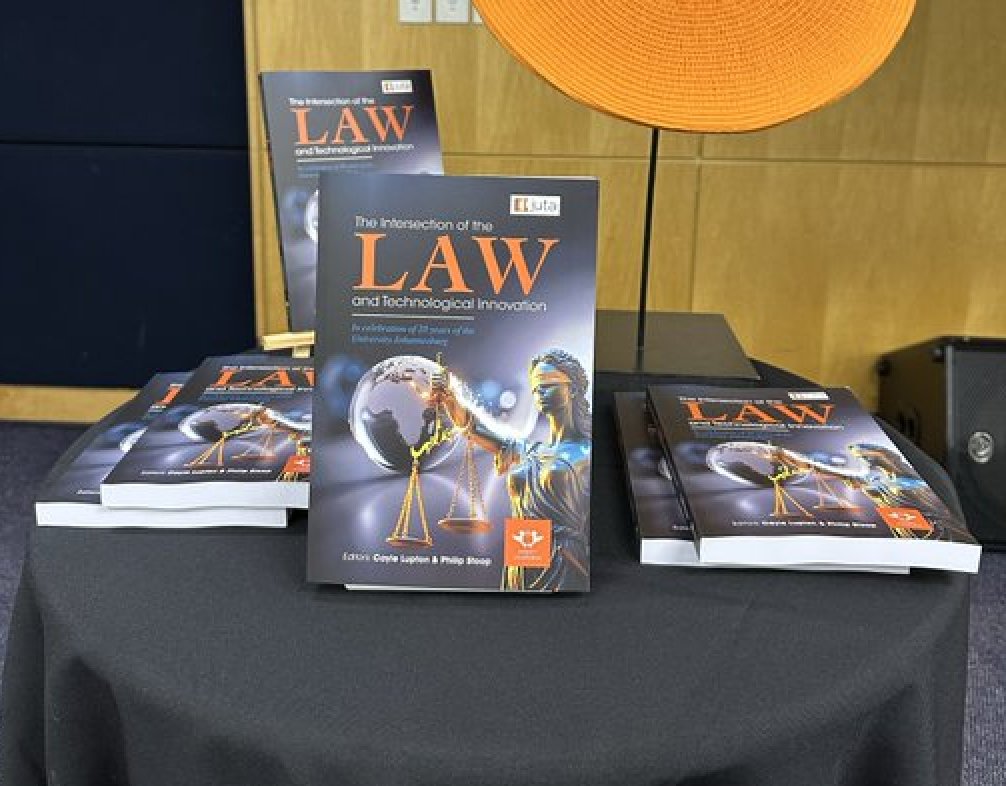The University of Johannesburg’s Faculty of Law continues to lead national and global conversation on the future of law and technology. On Friday, 7 November 2025, the faculty celebrated the launch of The Intersection of the Law and Technological Innovation: In Celebration of 20 Years of the University of Johannesburg, edited by Professor Cayle Lupton, Associate Professor and Director of the Centre for Banking Law, and Professor Philip Stoop from the Department of Mercantile Law.
The event took place at the Johannesburg Business School (JBS) Auditorium and was attended by esteemed guests, including UJ Vice-Chancellor and Principal, Prof Letlhokwa Mpedi, and retired Supreme Court of Appeal Judge Frans Malan.
Welcoming guests to the occasion, Prof Juanita Calitz, Vice-Dean: Research in the Faculty of Law and Programme Director, reflected on the faculty’s commitment to driving the future of legal innovation.
She noted: “But a vision alone is not enough. It needs drivers, substance, and a shared commitment to make it real. And today’s book launch reflects exactly that. The dedication, intellect, and innovative spirit that transform an idea into impact and a vision into reality. This landmark publication reminds us that true innovation is born from teamwork, from scholars, practitioners and visionaries joining forces to shape a more responsive and forward-looking legal world. When great minds unite, the future takes shape.”

In his address, Prof Charles Maimela, Executive Dean of the Faculty of Law, highlighted the faculty’s active role in advancing UJ’s strategic goals.
“The faculty is working on a number of initiatives and projects that fit into the broader UJ strategy that will ensure that we reclaim our former glory and ensure that the Vice-Chancellor and Principal, Prof Mpedi, also feels proud of his home faculty,” he said. “I’d also like to congratulate the editors of this important contribution that also ensured that our faculty does not remain behind and that we are also counted in the university’s important milestone of 20th anniversary.”
Prof Maimela also noted that the book builds on the momentum of the recently launched AI and the Law Institute, introduced in October.
Vice-Chancellor and Principal, Prof Letlhokwa Mpedi, who also contributed a chapter to the book, spoke passionately about its significance. “It is a profound honor to stand before you today for the launch of the Intersection of Law and Technological Innovation. This book, ladies and gentlemen, represents more than an academic contribution. It represents the conversion of two forces that have shaped my life and, I dare say, this institution. The law and the relentless pursuit of innovation,” he said.
Reflecting on the book’s development, Prof Mpedi shared his pride in the faculty and the editors. “The intersection of law and technological innovation is not just an academic text. It’s a declaration that legal education must evolve as the law engages with technological forces in shaping our world, and that lawyers must be equipped to address challenges their predecessors never imagined.”
He added: “Technological advancement, particularly in the Fourth Industrial Revolution, raises profoundly legal and ethical questions. They require lawyers who understand both the law and technology. They require institutions like UJ that embrace interdisciplinary thinking and invest in a better future that is already here.”
Judge Malan, who read the foreword, commended the book’s depth and diversity. He noted that its subjects are “quite astonishing,” ranging from regulation, data protection, smart contracts, artificial intelligence, social security, investment law, practice, and algorithms.

Prof Stoop described the book as a reflection of the faculty’s commitment to thought leadership and innovation. “This book represents a landmark contribution by the Faculty of Law to the evolving global discourse on law and technological innovation. It is not merely a collection of academic chapters—it reflects our faculty’s commitment to interdisciplinary research, ethical inquiry, and contextual relevance,” he said.
“By engaging with topics ranging from smart contracts and AI-powered ships to social security in the age of Industry 4.0, the book positions our faculty as a thought leader in navigating the legal implications of emerging technologies. It also affirms our role in shaping legal education and scholarship that is responsive to the realities of a rapidly changing world.”
The publication features contributions from legal scholars across South Africa, Ghana, the United States, and New Zealand, offering a rich diversity of perspectives. Each author brought unique insights informed by their legal systems, disciplines, and experiences.

The editors, Prof Lupton and Prof Stoop, both reflected on the collaboration with admiration and respect. “Phillip, it is an honor to have edited this book with you. I think if I could sum my interaction with you in three words or describe you in three words, it would be resilience, humility and a sense of humor,” said Prof Lupton.
The editors shared their hopes to expand partnerships with industry, regulators, and international institutions to co-create legal frameworks that are both innovative and inclusive.
“We must also continue to support emerging scholars, ensuring that the next generation of legal academics is equipped to tackle the challenges of digital transformation. Through rigorous scholarship, public engagement, and visionary leadership, our faculty will remain at the forefront of shaping the legal contours of technological change,” said Prof Lupton.
Ultimately, The Intersection of the Law and Technological Innovation calls attention to one of the most pressing challenges of our time, ensuring that rapid technological progress does not outpace the law’s ability to protect fundamental rights. From AI in financial compliance to privacy in digital spaces, the book provokes essential reflection on how law can both enable and regulate innovation to ensure a future that is just, equitable, and forward-thinking.




